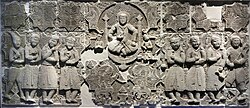| History of the Turkic peoples pre–14th century |
|---|
 |
The military of the Tang dynasty was staffed with a large population of Turkic soldiers, referred to as Tujue (突厥) in Chinese sources. Tang elites in northern China were familiar with Turkic culture, a factor that contributed to the empire's acceptance of Turkic recruits. The Emperor Taizong of Tang adopted the title of "Heavenly Khagan" and promoted a cosmopolitan empire. Turkic soldiers that served under the Tang dynasty originated from the Eastern Turkic Khaganate. It began with Taizong who sent his general Li Jing, eventually ended in defeating the Eastern Turks and capturing their leader Jiali Khan.[1]
Taizong regularly recruited and promoted military officers of Turkic ancestry, whose steppe experience contributed to the western and northern expansion of the Tang empire. The Turkic general Ashina She'er participated in the Tang capture of the Karakhoja, Karasahr, and Kucha kingdoms in Xinjiang. The half-Turkic general An Lushan started a revolt that led to the decline of the Tang dynasty.
The Orkhon inscriptions by the Gokturks were critical of the Turks that had served the Tang dynasty, and condemned them for helping the Tang emperor expand his burgeoning empire. The Turkic soldiers stationed in Tang garrisons of Central Asia settled in the region, spreading Turkic languages in the area.[citation needed]
- ^ New Book of Tang, vol. 93 "唐書 列傳 第十一至二五". Archived from the original on 2008-02-10. Retrieved 2007-12-18..